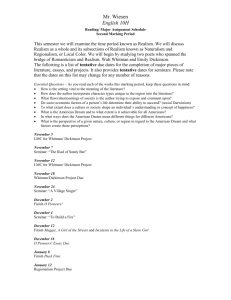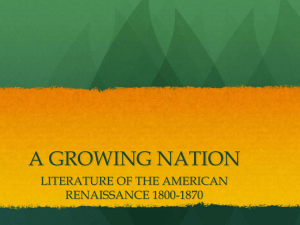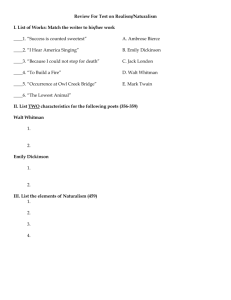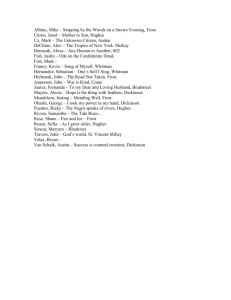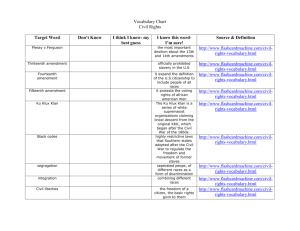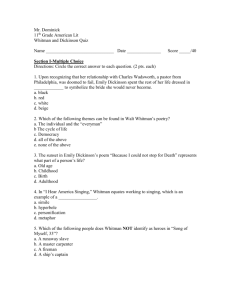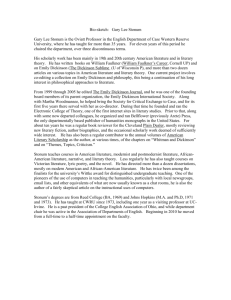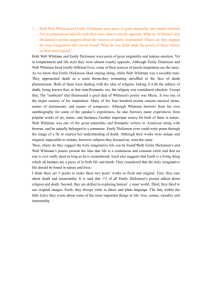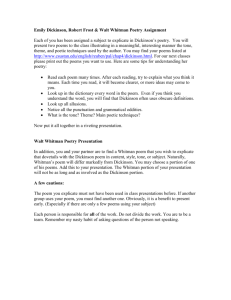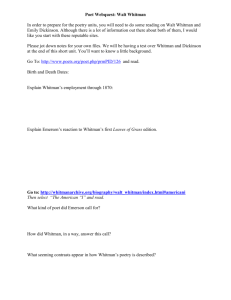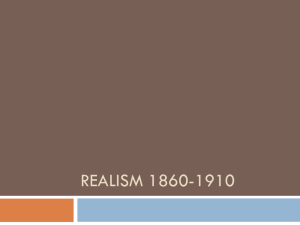Final Study Guide Spring
advertisement
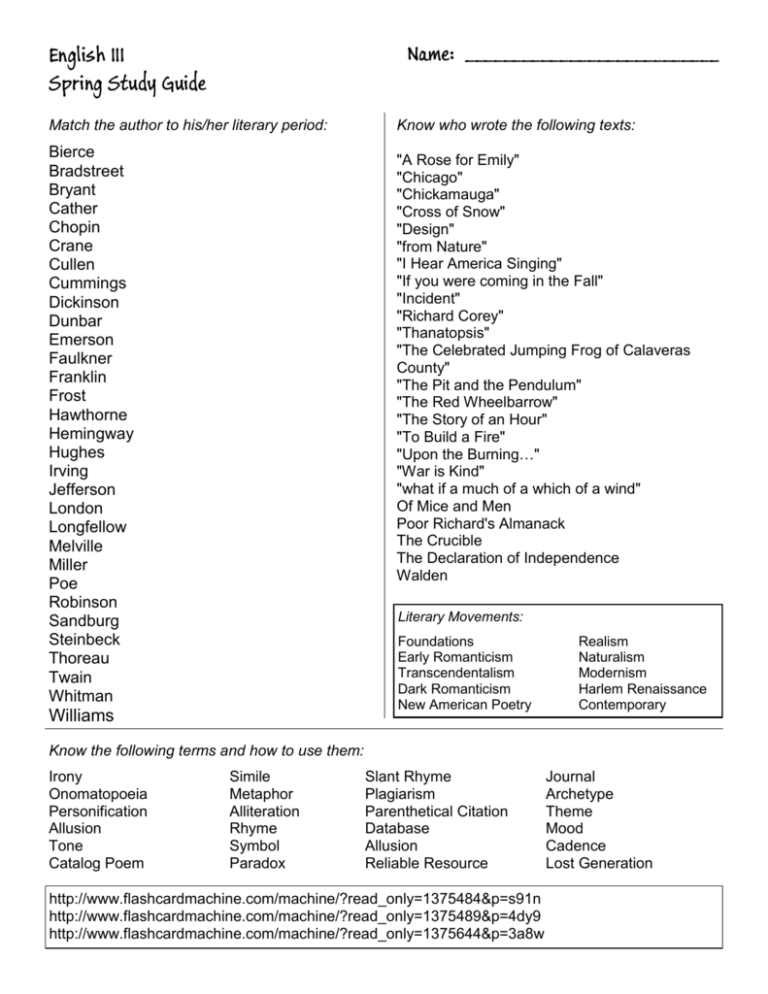
Name: ___________________________ English III Spring Study Guide Match the author to his/her literary period: Bierce Bradstreet Bryant Cather Chopin Crane Cullen Cummings Dickinson Dunbar Emerson Faulkner Franklin Frost Hawthorne Hemingway Hughes Irving Jefferson London Longfellow Melville Miller Poe Robinson Sandburg Steinbeck Thoreau Twain Whitman Know who wrote the following texts: "A Rose for Emily" "Chicago" "Chickamauga" "Cross of Snow" "Design" "from Nature" "I Hear America Singing" "If you were coming in the Fall" "Incident" "Richard Corey" "Thanatopsis" "The Celebrated Jumping Frog of Calaveras County" "The Pit and the Pendulum" "The Red Wheelbarrow" "The Story of an Hour" "To Build a Fire" "Upon the Burning…" "War is Kind" "what if a much of a which of a wind" Of Mice and Men Poor Richard's Almanack The Crucible The Declaration of Independence Walden Literary Movements: Foundations Early Romanticism Transcendentalism Dark Romanticism New American Poetry Williams Realism Naturalism Modernism Harlem Renaissance Contemporary Know the following terms and how to use them: Irony Onomatopoeia Personification Allusion Tone Catalog Poem Simile Metaphor Alliteration Rhyme Symbol Paradox Slant Rhyme Plagiarism Parenthetical Citation Database Allusion Reliable Resource http://www.flashcardmachine.com/machine/?read_only=1375484&p=s91n http://www.flashcardmachine.com/machine/?read_only=1375489&p=4dy9 http://www.flashcardmachine.com/machine/?read_only=1375644&p=3a8w Journal Archetype Theme Mood Cadence Lost Generation Whitman & Dickinson 1. What is the tone of Whitman’s poems? 2. What is Dickinson’s style like? 3. How did Dickinson and Whitman impact later poets? 4. What is a similarity between Whitman and Dickinson? Modern Literature 5. What literary device plays the most significant role in literary periods after Whitman and Dickinson’s? 6. How is Modern literature different from earlier periods? Realism 7. What historical event impacted the Realism period? 8. Why is that period called “Realism”? Research/Sources 9. What is the most reliable type of websites? 10. When evaluating sources coming from URL’s that end in .edu, what is the best indicator of their reliability? 11. What is the best indicator that an author is credible? 12. What are the qualities of credible websites? 13. What is the best method for finding credible sources for research? 14. What must an in-text citation include? Contemporary American Drama 15. What is unique about dram a that make it challenging to write? 16. Why is drama so interdependent upon other genres of literature and art? You will write an essay evaluating a poem. You will NOT be scored on whether you correctly identify the movement; however, you WILL be scored on how well you defend your position. The scoring rubric for your essay is below. CC Standard Description 51. CC.11-12.R.L.1 Cite strong evidence and thorough textual evidence to support analysis of what the text says explicitly as well as inferences drawn from the text, including determining where the text leaves matters uncertain. 52. CC.11-12.R.L.2 Determine two or more themes or central ideas of a text and analyze their development over the course of the text, including how they interact and build on one another to produce a complex account; provide and objective summary of the text. 53. CC.11-12.R.L.9 Demonstrate knowledge of 18th–, 19th-, and early 20th century foundational works of American literature, including how two or more texts from the same period treat similar themes or topics. 54. CC.11-12.R.L.10 Read and comprehend literature, including stories, dramas, and poems. 55. CC.11-12.W.1.a Introduce precise, knowledgeable claims, establish the significance of the claims, distinguish the claims from alternate or opposing claims, and create an organization that logically sequences claims, counterclaims, reasons and evidence. 56. CC.11-12.W.1.b Develop claims, and counterclaims fairly and thoroughly, supplying the most relevant evidence for each while pointing out the strengths and limitations of both in a manner that anticipates the audience’s knowledge level, concerns, values, and possible biases. 57. CC.11-12.W.1.e Provide a concluding statement or section that follows from and supports the argument presented. 58. CC.11-12.L.1 Demonstrate command of the conventions of standard English grammar and usage when writing or speaking. 59. CC.11-12.L.2 Demonstrate command of the conventions of standard English capitalization, punctuation, and spelling when writing. 60. CC.11-12.L.6 Acquire and accurately use general academic and domain-specific words and phrases, sufficient for reading, writing, speaking, and listening at the college and career readiness level; demonstrate independence in gathering vocabulary knowledge when considering a word or phrase important to comprehension or expression. http://www.flashcardmachine.com/machine/?read_only=1375484&p=s91n http://www.flashcardmachine.com/machine/?read_only=1375489&p=4dy9 http://www.flashcardmachine.com/machine/?read_only=1375644&p=3a8w
